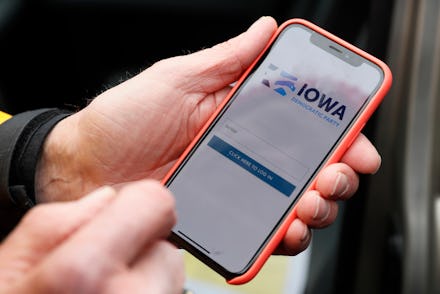The company behind the disastrous Iowa caucus app finally explained what went wrong

Iowa's presidential caucus was intended to kick off the 2020 presidential cycle, but the breakdown of an app designed to tally results did more to fuel confusion than get voters excited about political engagement. Since Monday, many have been wondering what exactly went wrong. Yesterday, Shadow, Inc.'s CEO finally issued an apology for its Iowa app, but there are still a lot of unanswered questions.
The Iowa Democratic Party (IDP) paid Shadow Inc. over $63,000 to develop an app that would allow precincts around the state to report their vote totals. There are 1,700 precincts in the state, and the chair of each precinct was supposed to download the app onto their own cellphone and send results to the IDP.
Instead of providing a simple solution to processing results, Shadow's app backfired. Along with the fact that not all of Iowa has access to reliable high-speed internet in order to download, let alone use, the app, TechCrunch reported that problems were evident with the app itself as early as 6:00 p.m. in Iowa.
With no solid back-up plan, Iowa was left scrambling. Votes were supposed to be tallied on Monday night, but they were still being released the following evening when Shadow's CEO, Gerard Niemira, appeared in an interview with Bloomberg News.
"I'm really disappointed that some of our technology created an issue that made the caucus difficult," Niemira said. "We feel really terrible about that."
Niermira's Twitter is locked, but the company's account tweeted out a statement from Niermira on Tuesday evening. In the statement, which also appears on its website, Niemira wrote, "We sincerely regret the delay in reporting the results of last night's Iowa caucuses and the uncertainty it has caused to the candidates, their campaigns, and Democratic caucus-goers."
In both his official statement and interview with Bloomberg, Niemira maintained that the problem didn't come from the app itself. All of the data was collected as it should have been and the app did its job, he said, which, Niemira told Bloomberg, was "to help precinct chairs in the field do the math correctly."
The issue came up when that data had to be sent to the IDP. At that point, a bug in the code became apparent, and Niemira told Bloomberg that it “had catastrophic impact.”
So, why did nobody catch the bug beforehand? Of course, part of the blame lies with Shadow because they built the app. However, the app was also the result of a rush by the Democratic National Committee. According to The New York Times, the app was built in just two months, so officials didn't adequately test the service before rolling it out.
"We will apply the lessons learned in the future, and have already corrected the underlying technology issue," Niemira wrote. "We take these issues very seriously, and are committed to improving and evolving to support the Democratic Party's goal of modernizing its election processes."
Even with the apology, there are a lot of remaining questions surrounding Shadow, namely if it will be used elsewhere. The company was contracted by the Nevada Democratic Party who now says it “will not be employing the same app or vendor used in the Iowa caucus.”